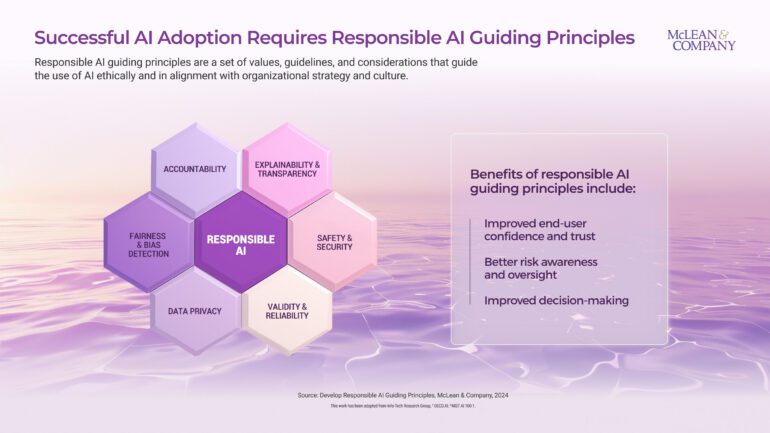- McLean & Company released a guide to assist HR in formulating AI guiding principles.
- The guide emphasizes the importance of HR in AI strategy despite often being sidelined.
- AI’s transformative impact necessitates proactive governance to manage risks and optimize benefits.
- Organizational and HR collaboration is key to crafting aligned AI principles.
- The guide offers a three-step framework: gather information, draft principles, and communicate iteratively.
- Flexibility and cross-functional input are crucial for evolving AI governance amidst dynamic regulatory and organizational landscapes.
Main AI News:
In the dynamic landscape of artificial intelligence (AI), organizations face an uphill battle to keep abreast of the ever-changing legislative, regulatory, and security landscapes. This challenge persists as AI technology evolves at a breakneck pace, asserts a recent publication by global HR think tank McLean & Company. The document underscores that while many enterprises are swiftly integrating AI solutions to gain a competitive edge, the formulation of AI strategy and governance often lags behind. Despite the pivotal role of HR in nurturing organizational culture and driving digital transformation, it frequently finds itself sidelined in strategic deliberations. To address this gap and empower both organizational and HR leaders in shaping responsible AI principles, McLean & Company has unveiled its latest offering, “Crafting Responsible AI Guiding Principles.”
“Numerous organizations overlook the implementation of responsible AI principles, a pivotal aspect of AI governance and broader strategy,” notes Lisa Highfield, Principal Director of Human Resources Technology and Artificial Intelligence at McLean & Company. “HR leaders possess not only the opportunity but also the obligation to ready the organization for change and ensure the success of AI integration as we navigate the future of work.“
In its latest resource, the consultancy elucidates how AI will revolutionize systems, processes, individuals, and entire organizations, with its impact accelerating in velocity, scope, and profundity. The introduction of AI can introduce friction within organizations, given the divergent perspectives and competing priorities among stakeholders.
Nevertheless, McLean & Company underscores that concerted efforts by organizational and HR leaders to establish aligned guiding principles can vastly facilitate the effective deployment and oversight of AI. To foster a collaborative approach to crafting responsible AI principles, the consultancy outlines a three-step framework for organizational and HR leaders:
Step 1: Information Gathering: Establish an AI governance committee tasked with deliberating organizational AI strategy and assessing associated risks spanning legal, regulatory, ethical, and compliance domains. Subsequently, pertinent inputs will be collated to inform the formulation of AI guiding principles.
Step 2: Principle Identification and Drafting: Conduct research and draft AI guiding principles tailored to the unique exigencies of the organization, elucidating the rationale and implications of each principle.
Step 3: Communication and Iteration: Initiate actionable steps, such as policy development and dissemination across employee cohorts. Finally, actively evaluate, maintain, update, and reinforce responsible AI guiding principles within the organization.
McLean & Company advises organizational and HR leaders against seeking a singular source of truth regarding an organization’s responsible AI principles. Instead, it advocates for a nuanced approach that considers industry dynamics, regulatory frameworks, legal mandates, compliance imperatives, and organizational idiosyncrasies, all of which are subject to evolution over time. Accordingly, the consultancy recommends the establishment of a cross-functional team encompassing HR to review AI governance and guiding principles, leveraging HR’s acumen in navigating ethical, legal, and people-centric challenges accompanying AI adoption.
Conclusion:
McLean & Company’s strategic guide underscores the imperative for HR leaders to engage in proactive AI governance. By prioritizing collaboration, organizations can navigate the complexities of AI adoption, ensuring responsible implementation while leveraging its transformative potential. This signals a growing recognition of HR’s pivotal role in shaping the future of work amidst rapid technological advancement.

